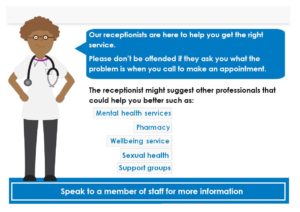We try to keep our GP appointments for patients with more serious health problems.
Before you book an appointment to see a doctor, please consider whether an appointment with an alternative clinician eg. Emergency Care Practitioner, Nurse Practitioner, Practice Nurse or Healthcare Assistant might be appropriate. They can help you with a wide range of medical problems.
The emergency care practitioner (ECP) is an advanced autonomous clinician who has evolved from a background in para-medicine. They are registered professionals with the Health and Care Professions Council (HCPC). They hold academic qualification to at least level 6 (BSc) and have the skills and experience way beyond that of a traditional ambulance paramedic. They have knowledge in emergency, acute and chronic illness and are able to manage patients who were traditionally seen by doctors within a set scope of practice. The role emerged out of changing workforce initiatives intended to improve patient access to care, investigations and treatment whilst offering a more holistic, accessible and responsive service for patients. Our ECPs offer pre-bookable, on the day urgent care surgery appointments and they also see patients at home if this is considered medically necessary by the duty doctor.
Care Navigation
Over the coming months you will notice your receptionist begin to ask for a brief outline of your problem when you ring to book an appointment.
This is because we are introducing something called “Care Navigation”. It means we are training receptionists and clerical staff to help them help patients by identifying the most appropriate place for their care.
Through this specialist training, our practice team will be able to direct you to the most appropriate health clinician for your needs first.
About Care Navigation
Receptionists will never offer clinical advice or triage; this new way of working is about offering you the choice to see more appropriate professionals in the practice team or even somewhere else. If they can deal with the problem directly, it will often be quicker and means you may not need to see the GP at all.
By working this way, it helps to free up time for GPs to care for patients with complex or serious health conditions that can only be managed by the GP. More importantly though, it means people are seen first by the clinician that is best placed to manage their clinical problem.
The choice is always yours though and you will never be refused a GP appointment but we hope next time you contact your GP and speak with the receptionist you will see the value of seeing another health professional if they are able to help.
Self care
If you have a cough, cold, headache or other minor ailment try treating yourself at home first. Find out more about treatments for common minor ailments here.
Please remember that self-care for common conditions can help free up our GPs’ time, making it easier to get an appointment when you have a more serious condition.
Your pharmacist can help too
Pharmacists are highly trained health professionals and can give you confidential health advice for a range of common illnesses and complaints.
Don’t wait for a GP appointment for coughs, colds, aches and pains. Just give your local pharmacy a call or drop in – there’s no need to make an appointment.
Your pharmacists can also help you decide if you need to see a doctor or nurse.
Find out more information about how pharmacies can help you here.
NHS 111
111 is the free NHS non-emergency number.
You should use the NHS 111 service if you urgently need medical help or advice but it’s not a life-threatening situation.
Call 111 if:
- you need medical help fast but it’s not a 999 emergency
- you think you need to go to A&E or need another NHS urgent care service
- you don’t know who to call or you don’t have a GP to call
- you need health information or reassurance about what to do next
Find out more information about how NHS 111 can help you here.
Accident & Emergency
A&E is for life-threatening accidents and emergencies only. Before you go there, ask yourself ‘Is it a real emergency?’
If not, please consider using other local health services before you visit A&E.



